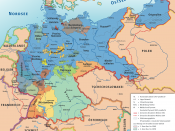The Great Depression of the 1930s was a result of World War I. Germany had to pay off war debts to France and Britain, but in the meantime, they borrowed money from the U.S. There was a chain connecting everyone, and when Germany finally failed to pay France and Britain, the chain of money stopped. France and Britain could not pay the U.S. back, and the stock market crash ensued shortly afterwards. Its severity was due to the chain reactions and interlocking of the different countries. Germany was suffering major inflation, and simply could not pay or make up its debt to the other countries. If France and Britain were equally blamed for the war, it may not have happened, because Germany would not be supporting the countries economically.
The National Government took three decisive steps to attack the depression. First, to balance the budget, it raised taxes, cut insurance benefits to the unemployed and the unemployed and the elderly, and lowered government salaries.
Its leaders argued that the fall in prices that had taken place meant that those reductions did not appreciably cut real income. Second, in September 1931, Britain went off the gold standard. The value of the British pound on the international money market fell by about 30 percent. This move somewhat stimulated exports. Third, in 1932 Parliament passed the Import Duties Bill, which placed a 10 percent ad valorem tariff on all imports except those from the empire. Gold and free trade, the hallmarks of almost a century of British commercial policy was abandoned. The Popular Front, on June 8, 1936, immediately raised wages from 7 and 15 percent, depending on the job involved. Employers were required to recognize unions and to bargain collectively with them. Workers were given annual, paid two-week vacations. The forty-hour week...



Study notes...
Yet again, informative, thorough, detailed and concise. Strong research item as it provides excellent information on a common classroom topic.
Great work, ccmustangs2001.
4 out of 4 people found this comment useful.